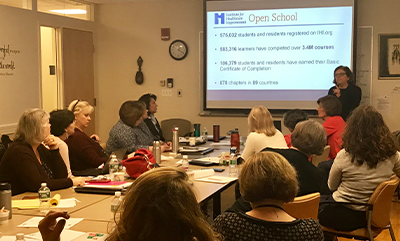Leadership Institute Empowers School Nurses ‘on Front Lines’.
 School nurses play a vital role in keeping children healthy and safe every day. From advocate to care coordinator, school nurses fulfill numerous roles to address the physical, mental, emotional, and behavioral health challenges that students experience.
School nurses play a vital role in keeping children healthy and safe every day. From advocate to care coordinator, school nurses fulfill numerous roles to address the physical, mental, emotional, and behavioral health challenges that students experience.
To ensure that nurses have the most up-to-date and effective tools they need to address these complex issues, the School of Public Health’s Population Health Exchange (PHX) and the School Health Institute for Leadership and Development (SHIELD) have launched their inaugural Summer Leadership Institute for School and Public Health Nurses in June 2018.
Since then, a group of 25 nurses from schools throughout Massachusetts have participated in workshops and seminars to sharpen their skills in leadership and mentoring in a school setting.
“Leadership is a key practice role of the 21st-century school nurse and public health nurse, yet there is a gap in the availability of quality leadership training programs,” says Beverly Heinze-Lacey, manager of SHIELD. “SHIELD and PHX established the Leadership Institute to address this gap, and our goal is to provide training that empowers school and public health nurses to become change agents in addressing the complex health needs and health disparities faced by members of their communities.”
Led by SPH faculty and instructors, the workshops have focused on a range of topics, including strategic management skills, developing effective teams, managing conflict, and impactful communication.
With the mission of “Moving School Health Forward,” the group of school nurses—aptly named the Nurse Empowerment Team—will not only implement this knowledge in their own school settings, but also form an advisory board to develop a statewide mentoring framework for school nurses.
Kristen Bunten, a healthcare coordinator for Ludlow Public Schools, said the workshops provided insight into her leadership strengths and where she needs to challenge herself to grow as a leader.
“One of the most challenging aspects of school nursing is having to prioritize your time, energy, and focus, while working with limited resources, funding, and staff. The needs are endless and overwhelming,” said Bunten, citing nursing treatments, medications, counseling, homelessness, and poverty. “The conversations I‘ve had with the amazing school nurse leaders remind me of my role in the school system, help me confidently own where I am successful as a leader, and encourage me to become an even better advocate for children.”
Jill Gasperini, director of school health services for Lexington Public Schools, said she particularly appreciated a workshop on using data to communicate public health messaging, as well as a session that guided the nurses to embrace change, including the expanding role of technology in student health.
“Children have complex medical needs, and they are definitely coming to school with more technology,” Gasperini says. “A student with diabetes will now come in with a continuous glucose monitor and a pump that pumps in insulin medication.
“The role of a school nurse is becoming more valued by the healthcare system because we’re on the front lines with the children every day,” Gasperini continued. “School nurses have always worked hard to take care of children, but there’s become a stronger understanding and awareness of the important role that they play in a school setting and within the community.”
“It has been a privilege to work with this group of dedicated, compassionate, and innovative school nurse leaders,” says Leslie Tellalian, director of lifelong learning. “The work they do is vital to the health and well-being of the school community. Our work has been focused on developing a recognized mentoring program that will ensure that all school nurses feel supported and integrated as part of the leadership team in school communities.”
In addition to the leadership sessions, the nurses were invited to attend all of the Signature Program events at SPH, including the Dean’s Symposium “Nursing and the Health of Populations” on April 2. Prior to the symposium, Maureen Bisognano, president emerita and senior fellow of the Institute for Healthcare Improvement and a moderator of the event, spoke with the group about leadership and the importance of exhibiting compassion as a nurse.
“We can’t only ask our patients what is the matter—we have to ask, “What matters to you?’” Bisognano said. “This one simple question is changing not only the way that professionals are interacting with patients; it is also changing their clinical outcomes. Compassion has a scientific basis on making people better, faster.”